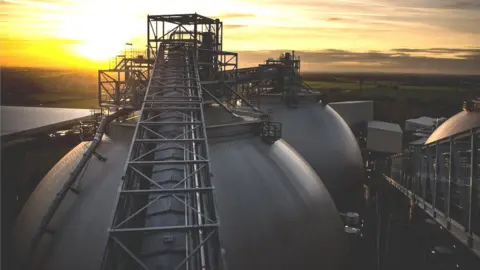Drax power station to cease burning coal in March 2021
 PA
PAEnergy company Drax is to stop burning coal at its North Yorkshire power station - once one of western Europe's biggest polluters - from March 2021.
It says it will then close its two coal units in September 2022 with the loss of 230 jobs at the site near Selby.
The move comes ahead of a government ban on coal-fired electricity in 2025.
Drax said it had held discussions with the National Grid, the regulator and the government before deciding to end commercial coal generation.
"Ending the use of coal at Drax is a landmark in our continued efforts to transform the business and become a world-leading carbon negative company by 2030," said chief executive Will Gardiner.
Coal represented about 3% of Drax's power generation in 2019, down from 30% in 2016.
 Drax
DraxBritain has increasingly managed to wean its electricity supply off coal. Last year the country's power networks went for more than a fortnight without burning a single lump, thought to be the first time since the 1880s.
As of 08:00 GMT on Thursday, coal was supplying only 1.9% of the country's energy needs. It has largely been replaced by gas, which provided 50% and wind, 17%.
However, coal is still being used for industrial purposes, such as steelmaking.
Drax already produces power from biomass by burning wood pellets.
Mr Gardiner said: "By using sustainable biomass we have not only continued generating the secure power millions of homes and businesses rely on, we have also played a significant role in enabling the UK's power system to decarbonise faster than any other in the world."
However, critics of biomass say it causes deforestation and encourages farmers to grow monocrops just to be burned.
The company said adjusted profit before tax hit £142m in 2019, up from £37m the year before, on revenues of £4.7bn, up 11%.
